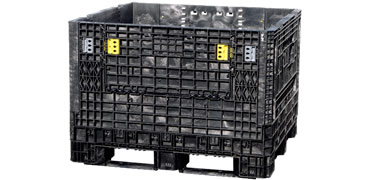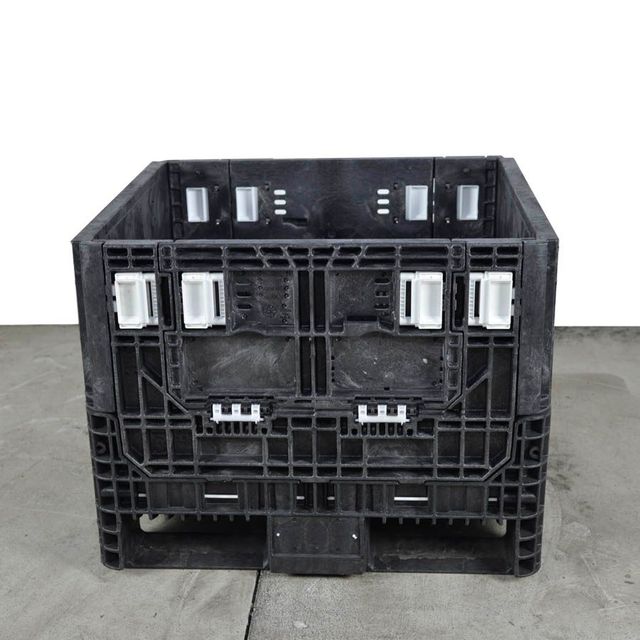Why Mass Containers Are Crucial for Cost-Effective and lasting Transport
Bulk containers play an important role in contemporary logistics. They promote the efficient activity of huge amounts of products, thereby optimizing transport processes. This approach not just decreases prices but likewise reduces ecological effect through reduced discharges and waste generation. As markets seek even more lasting techniques, the fostering of bulk containers is becoming increasingly significant. What effects does this change hold for future logistics and supply chain monitoring?

The Benefits of Using Bulk Containers in Logistics
Bulk containers change logistics by boosting performance and sustainability. These containers allow for the transport of large amounts of goods in a solitary journey, noticeably reducing the variety of journeys required. This not only streamlines procedures however additionally decreases labor costs connected with handling, filling, and dumping. In enhancement, bulk containers are made to maximize area use within transportation lorries, guaranteeing that even more items can be shipped concurrently.
The standardization of mass containers additionally simplifies the logistics process. With uniform dimensions, they can be quickly stacked and kept, bring about enhanced storehouse monitoring. Bulk containers typically include durable materials that protect components from damages during transportation, consequently decreasing product loss and enhancing general reliability. Consequently, businesses can experience improved supply chain efficiency, inevitably resulting in increased profitability and consumer satisfaction. This mix of elements makes bulk containers an essential property in contemporary logistics.
Ecological Influence: Lowering Waste and Carbon Footprint
As markets increasingly prioritize sustainability, the fostering of bulk containers has actually arised as a key strategy for lowering waste and lowering carbon footprints. These containers decrease the use of packaging products, such as boxes and plastic, consequently significantly decreasing overall waste generation. By consolidating shipments, mass containers enhance transportation efficiency, enabling for more products to be transferred per journey. This reduction in journeys directly associates with lower greenhouse gas exhausts, adding to a smaller sized carbon impact.
Mass containers can usually be recycled or reused, even more reducing environmental effect. The durability of these containers warranties they can endure multiple transport cycles, minimizing the requirement for single-use options. used bulk containers. By enhancing logistics and promoting efficient resource usage, bulk containers not just sustain lasting methods but additionally urge industries to line up with international ecological objectives. Inevitably, their execution mirrors a dedication to environmental stewardship and accountable resource monitoring
Cost Financial Savings: Just How Mass Containers Lower Transportation Expenditures
While many companies look for methods to enhance their lower line, using mass containers provides a significant chance for decreasing transport expenditures. Bulk containers take full advantage of the quantity of items transferred, enabling organizations to ship bigger quantities simultaneously. This efficiency lowers the number of journeys required, straight decreasing gas costs and minimizing labor costs associated with loading and dumping.
Furthermore, mass containers usually feature structured styles that optimize space utilization within transport lorries. This indicates fewer voids, leading to extra effective use offered ability. Moreover, the sturdiness of mass containers can decrease the threat of item damages during transportation, lowering losses and making sure that even more products show up intact.
Enhancing Supply Chain Effectiveness With Bulk Storage Space Solutions
Bulk storage space services play an important role in boosting supply chain efficiency by enhancing supply administration. By consolidating products into less, larger containers, services can significantly decrease managing costs connected with constant transfers and processing. This streamlined method permits much better monitoring and management of supply, inevitably resulting in improved functional performance.
Structured Supply Management
Effective stock monitoring is important for enhancing supply chain operations, particularly when companies embrace bulk storage space options. These options enable services to keep greater supply levels while reducing the regularity of replenishment. By settling products into bulk containers, business can improve their supply processes, minimizing the complexity connected with tracking numerous smaller sized plans. This technique facilitates exact supply matters and enhances projecting precision, allowing for even more informed decision-making. check here On top of that, mass storage space services simplify stockroom organization, making it much easier to find and accessibility items when needed. Because of this, companies can accomplish a much more reliable stock turnover price, eventually enhancing general supply chain performance and decreasing the possibility of stockouts or overstock circumstances.

Lowered Handling Expenses
The execution of bulk storage space services not only simplifies inventory management but additionally substantially decreases handling expenses throughout the supply chain. By combining materials right into mass containers, companies reduce the requirement for constant handling and transfer in between different storage space and transport systems. This technique cuts down on labor prices related to loading, dumping, and relocating smaller packages. In addition, bulk storage minimizes the frequency of deliveries, bring about reduced transportation prices and lowered fuel usage. Consequently, organizations can enhance their logistics procedures, enabling a much more efficient allowance of resources. Inevitably, lowered dealing with costs add to enhanced general supply chain performance, fostering an environment that sustains both sustainability and economic practicality.

Flexibility of Mass Containers Throughout Numerous Industries
Several industries have distinctive requirements for transportation and storage space, mass containers have arised as a versatile service that meets a wide variety of needs. These containers, ranging from big bins to specialized tanks, can suit diverse materials, including fluids, powders, and granules. In the farming market, bulk containers promote the transport of grains and fertilizers, while the food and drink market uses them for active ingredients and completed items. The chemical market depends on mass containers for safely moving dangerous products, making sure compliance with safety and security policies. Additionally, construction companies gain from bulk containers for moving aggregates and other products. Their versatility encompasses various settings of transportation, consisting of trucks, trains, and ships, enhancing logistical effectiveness. This versatility not just streamlines operations throughout various sectors however likewise advertises sustainability by lowering product packaging waste and enhancing area en route. Bulk containers play a crucial duty in modern supply chain administration.
Future Trends wholesale Container Use and Sustainability
The future of mass container usage is increasingly formed by innovative products advancement that boosts sustainability. In addition, automation in logistics assures to improve procedures, lowering waste and boosting efficiency. Embracing round economic situation practices will certainly even more revolutionize exactly how bulk containers are designed, utilized, and recycled, promoting a more sustainable transport landscape.
Ingenious Materials Advancement
As markets progressively prioritize sustainability, innovative materials growth in bulk containers becomes a substantial consider improving eco-friendly transportation options. Manufacturers and scientists are exploring eco-friendly plastics, recycled compounds, and lightweight steels to reduce ecological influence. These products not just reduce waste however also enhance fuel effectiveness by lowering the overall weight of containers. In addition, developments in clever materials, which can adjust to varying problems, enhance the sturdiness and functionality of bulk containers. The combination of these ingenious products straightens with round economy concepts, promoting reuse and recycling. As the need for sustainable techniques expands, the development of such materials will play a vital duty in shaping the future of bulk container use in logistics and transportation.
Automation in Logistics
Significant innovations in automation are positioned to transform logistics and the usage of bulk containers, boosting sustainability in transportation. Automated systems, including drones and self-governing vehicles, are improving the activity of bulk containers, lowering the reliance on conventional fuel-powered transport. These innovations maximize transmitting and packing procedures, enhancing and lessening empty miles gas performance. Additionally, automated supply administration systems enhance tracking and monitoring of mass containers, making certain better source allocation and reduced waste. The combination of the Internet of Points (IoT) enables real-time information evaluation, enabling aggressive decision-making that lines up with sustainability goals. As automation remains to evolve, it is expected to drive better advancements in bulk container usage, inevitably sustaining more sustainable logistics methods and reducing the ecological influence of transportation.
Round Economy Practices
Innovations in automation are setting the phase for an extra incorporated approach to round economic situation techniques in the domain name of mass container usage. As sectors increasingly welcome sustainability, bulk containers are being designed for durability and reusability. This change not only lessens waste yet likewise enhances source performance. Firms are taking on strategies such as closed-loop systems, where used containers are accumulated, reconditioned, and reintroduced right into the supply chain. In addition, clever modern technologies track container life process, promoting far better administration and minimizing ecological impact. The collaboration between makers, logistics carriers, and end-users is necessary in developing standards for lasting container use. refurbished bulk containers. Future trends show an expanding emphasis on products that are recyclable and eco-friendly, more strengthening the circular economic situation's principles in bulk transport

Frequently Asked Questions
What Materials Are Mass Containers Commonly Made From?
Mass containers are normally constructed from long lasting materials such as high-density polyethylene, light weight aluminum, cardboard, and steel. These products offer toughness, protection, and adaptability, making them appropriate for transporting various goods in different industries efficiently.
Just how Do I Pick the Right Dimension Bulk Container?
Choosing the best dimension bulk container involves reviewing the volume of products to be delivered, considering handling equipment compatibility, and appraising storage area demands. Proper size warranties effectiveness in transport and lessens waste during delivery.
Are Bulk Containers Reusable or Recyclable?
Mass containers are typically recyclable, designed for several journeys, enhancing sustainability. Numerous can also be reused, depending on the materials used. Selecting recyclable alternatives even more sustains ecological goals and minimizes waste in transport methods.
What Safety Regulations Apply to Mass Container Transportation?
Safety regulations for bulk container transportation include conformity with the Division of Transport standards, correct labeling of unsafe products, structural integrity analyses, and adherence to weight limitations to guarantee risk-free handling and prevent accidents during transportation.
Exactly How Can Organizations Shift to Using Mass Containers Efficiently?
Companies can alter to bulk containers by reviewing current logistics, training team on handling, purchasing appropriate devices, enhancing supply monitoring, and collaborating with suppliers to guarantee compatibility and performance throughout the supply chain.
As markets progressively focus on sustainability, the fostering of bulk containers has arised as a key method for minimizing waste and decreasing carbon impacts. By settling products into bulk containers, firms can simplify their stock processes, decreasing the complexity associated with tracking several smaller sized packages. As markets increasingly focus on sustainability, ingenious products advancement in mass containers emerges as a considerable variable in improving eco-friendly transportation solutions. Automated systems, consisting of drones and independent cars, are improving the motion of bulk containers, minimizing the reliance on standard fuel-powered transportation. In addition, automated supply monitoring systems enhance tracking and surveillance of bulk containers, making certain better resource allowance and decreased waste.